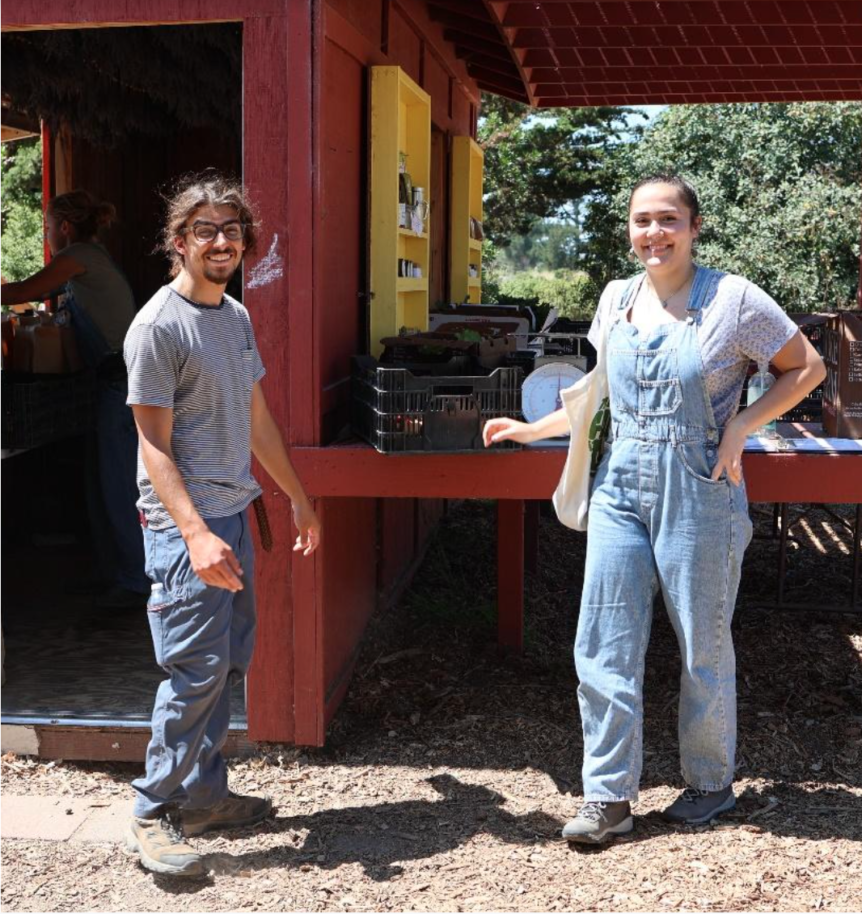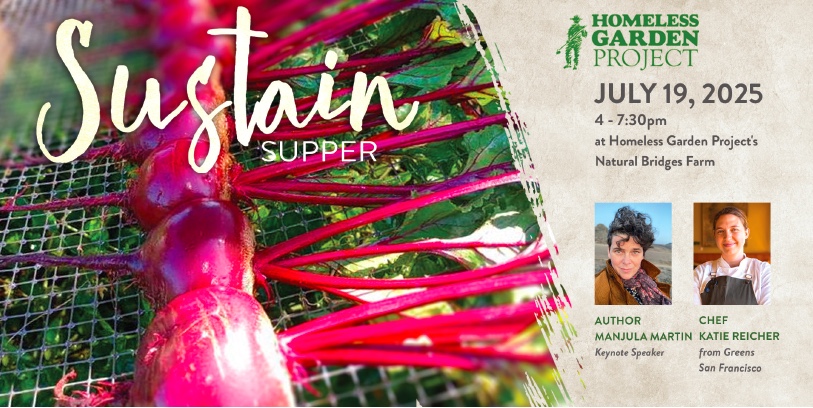The Homeless Garden Project Farm provides an avenue for Agriculture Therapy. It is a site for the community to come together and experience healing, growth, and solace.
My Journey with HGP
The Homeless Garden Project is a unique site representing strength and resilience in the Santa Cruz community. This farm provides a healing and therapeutic setting for everyone involved.
During my time in Santa Cruz, I have been fortunate enough to connect with HGP in a variety of ways and gain a deeper understanding of how the farm positively impacts individuals’ well-being. As a recent Sociology Graduate at UCSC, my core interest has been in the emerging field of nature therapy. In a time when urbanization and disconnection with nature are rapidly increasing, I am passionate about reconnecting with nature as a form of therapy and means of combating the negative consequences of rapid urbanization.
I became specifically interested in agriculture as a form of nature therapy. Agriculture is supported as an accessible and efficient way to connect with nature and apply as a therapeutic intervention.
HGP provides transitional employment and support services to those affected by homelessness while providing a space for everyone in the community to experience the positive effects of agricultural work. The HGP farm provides an avenue for nature therapy while addressing the negative effects of urbanization on individuals’ well-being and our social and ecological environment. It is an ideal location for studying and experiencing agriculture therapy first hand.
My journey with HGP started as a weekend volunteer. I was grateful to find an organization that aligned with my personal and educational ideals. I quickly jumped at the opportunity to participate in a summer internship. As part of the internship, I designed a capstone project to summarize what I had learned and to give back to HGP.
I designed a program called the Student Connection Program (SCP) in which I worked with local high schools to bring students to the farm. The program had two core goals:
(1) to connect students with nature and organic food via learning basic agricultural tasks; and
(2) to have students meet and learn agricultural tasks directly from a member of their community affected by homelessness.
The goal was to encourage students to interact positively with nature and people in our community experiencing homelessness. Based on my experience, those involved in the Student Connection Program, and those I worked alongside, I found that working on the farm had a strong positive impact on psychological health and social connection. I believed there was something very special and important to be found on the farm. With my interest in nature therapy in mind, I was eager to study the effects of agricultural work on well-being in more depth.
The majority of my involvement with HGP and one of my most rewarding experiences was conducting my senior thesis research project on “The Effects of Agriculture on Well-being at the Homeless Garden Project Farm” This blog summarizes my project and its significant findings.

Background on Nature Therapy
Origins: The idea that connecting with nature benefits well-being is not new. However, the study of nature as an applied therapy is an emerging academic field of research. Nature therapy focuses on the benefits of connecting with nature and applying findings to improve well-being and reduce the negative consequences of rapid urbanization.
Key Studies
ShinRin-Yoku: Some of the first studies to popularize this field of research came out of Japan. Nature Therapy, described as ShinRin-Yoku in Japan, translates to forest bathing. These studies found that nature positively affects stress levels by stimulating the parasympathetic nervous system responsible for relaxation and reducing our fight or flight response.
Kaplan’s Attention Restoration Theory: According to this theory, natural stimuli restore our capacity for focus and mental cognition by allowing us to relax from the constant overstimulation and mental fatigue associated with our urban environment.
Key Takeaways
Through analyzing the available literature, I found that full immersion in a natural environment and the formation of a deep connection and reciprocal relationship with nature, not just mere exposure, was vital in providing the highest degree of benefits.
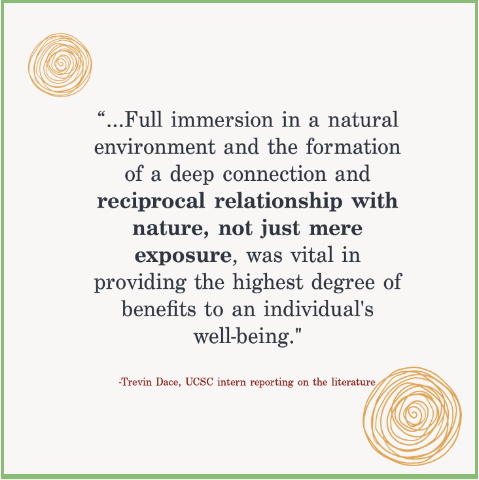
Agriculture as Nature Therapy
Agriculture has historically been used in mental health/rehabilitation settings and is supported as a desirable and accessible form of nature therapy. It engages all of our senses, encouraging a deep relationship with nature beyond mere exposure.
My Study
Building on previous findings, I designed a study to address the following questions:
(1) How does agricultural work affect psychological and social well-being?; and (2) What factors mediate the benefits of agricultural work? My goal was to understand how agriculture benefits individuals’ well-being and what aspects of HGP’s farm foster agriculture therapy.
Methodology
I interviewed interns, staff, and trainees about different aspects of psychological and social well-being related to agricultural work. I then analyzed the responses to identify common themes.
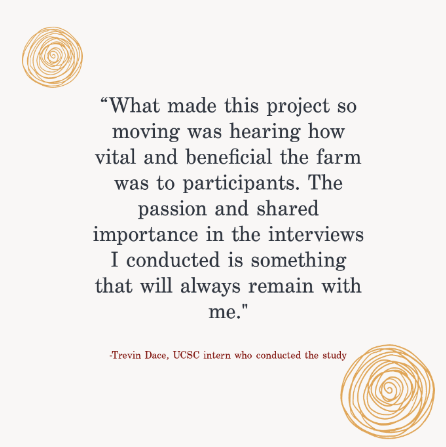
Findings: Benefits
The findings highly support that HGP’s farm provides an effective and ideal application of nature therapy and positively affects well-being. Every participant reported that agricultural work provided multiple benefits to their well-being. A large majority reported benefits to every area of well-being the study analyzed. What made this project so moving was hearing how vital and beneficial the farm was to participants. The passion and shared importance in the interviews I conducted is something that will always remain with me. The following are the benefits the study found the farm to provide:
- Deepened relationship with nature: All participants described experiencing a deeper relationship with nature. Agricultural work moved beyond exposure to nature to developing a deep reciprocal relationship with nature.
- Positive emotions: Happiness, gratitude, and calm were widely reported.
- Decreased stress: Agricultural work and immersion in the natural environment of the farm quickly mitigated individuals’ stress responses. The farm helped individuals gain the skills and confidence to cope with and overcome stress.
- Flow state: Agricultural work induced this meditative state of direct connection with the task at hand.
- Fulfillment: Agricultural work provided participants with a deep sense of purpose and fulfillment.
- Self-confidence: Working on the farm boosted self-confidence and encouraged authenticity.
- Spiritual inspiration/transcendence: All participants passionately described the farm as supporting spiritual reflection/inspiration and transcendence or “a connection to something beyond themselves.” This finding was among the most significant and stood out in comparison to other studies on nature therapy. The shared expression of this finding supports this as being a source of connection and social bonds on the farm. As one participant observed, “When I’m on the farm I feel like I’m walking through nature’s cathedral.”
- Social connection: Agricultural work increased social skills and promoted strong, rapid social bonds on the farm and with the larger community.
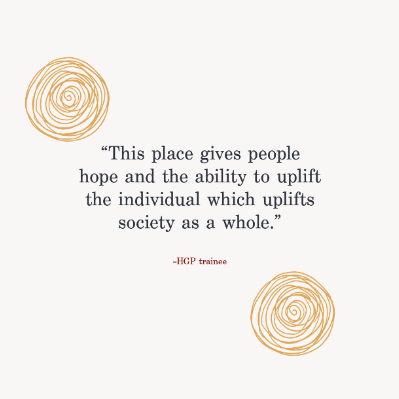
Findings: Mediating Factors
Many factors mediated the benefits of work on the farm, revealing how agricultural work benefits well-being and how HGP provides an ideal environment for agriculture therapy. The following is a list of the core mediating factors, with the first three being the most impactful:
- Integral part of cultivation: Being involved with the growth of plants developed a reciprocal relationship between participants and nature. One in which the individual and plant provided for each other. This mediated a sense of accomplishment and purpose.
- Staff cultivation of positivity: Staff encouraged a positive environment and relationship with agriculture. Trainees were encouraged in their success as stewards of the farm.
- Acknowledgment of agriculture’s benefits: Although all participants supported agricultural work to benefit their well-being, those that reported the greatest benefits were conscious that agriculture and connecting with nature have the ability to provide ample benefits to their well-being. So next time you are strolling through the forest, in your garden, or on the farm, keep this in mind!
- Agency in enacting positive change: By working at the farm, participants positively impacted the environment and community. As one participant observed, “This place gives people hope and the ability to uplift the individual which uplifts society as a whole.” This experience mediated benefits such as self-confidence, fulfillment, and positive emotions.
- Necessitated teamwork: Agricultural work isn’t easy, efficiency requires teamwork and diverse perspectives. HGP fosters collaboration, boosting social skills and strong social bonds.
- Tangible metaphors and life lessons: The nature of farm work provided a tangible space for participants to process and learn life lessons. Participants described that weeding and nursing plants to health reflected their own journey of personal growth.
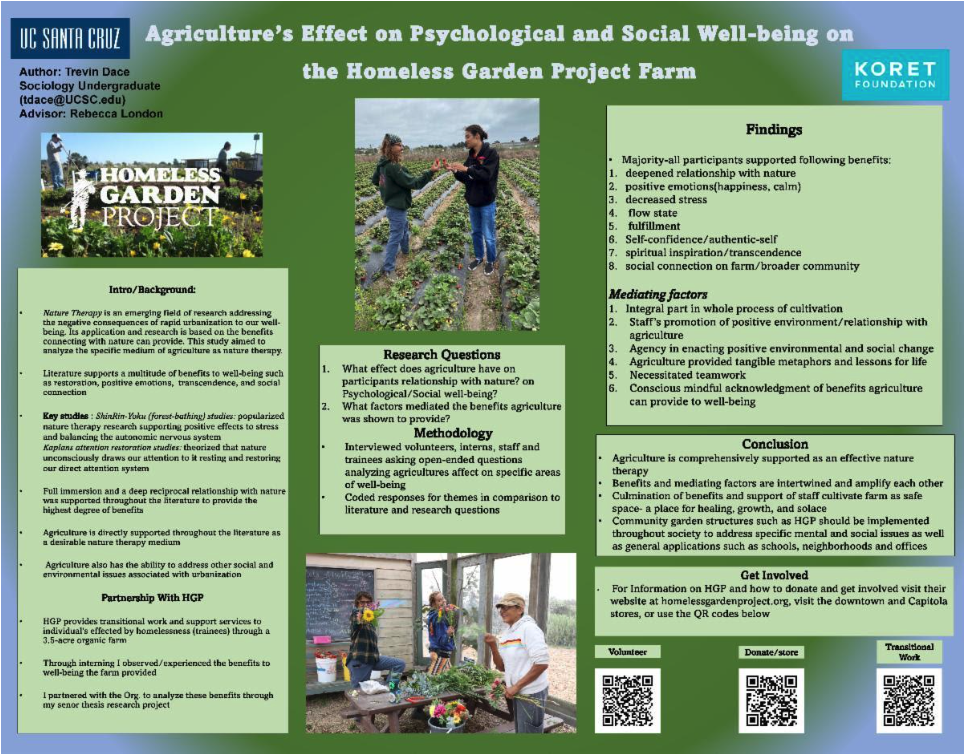
What to takeaway:
The core conclusions from this study include:
- agriculture is an effective medium for applying nature therapy and it provides a multitude of benefits to individuals’ well-being;
- agriculture is an accessible tool for improving well-being and should be widely implemented;
- HGP’s model and the findings of this study can be used as a framework for implementing agriculture therapy throughout society
Working on the HGP farm is an experience that I and many others will forever be grateful for. The culmination of benefits and the cultivation of the positive environment of the farm by everyone involved creates what Professors Heather Bullock and Shirley Truong describe as a “safe space” in their article on HGP: Digging Deeper into “Cultivating Community:” Our Community Education & Volunteer Program | Homeless Garden Project.
The Farm is a site for growth, healing, and solace. I hope individuals walk away from reading this article with a motivation to connect with nature, pass the message of its importance on, and come experience the HGP farm for themselves. As one participant put it “The farm is just magic and folks just need to come experience that magic for themselves to see what it can really offer them.”
I am thankful to HGP and everyone involved for giving me the opportunity to connect with such a special place and for sharing the love and care that the farm fosters. I will forever be grateful.
Special thanks to; the participants of this study for taking part and providing such honest and passionate responses, Professor Rebecca London for advising me throughout the whole process, Professor Heather Bullock who provided feedback and inspiration to the project, and the HGP staff– Darrie, Ella, Mike, Francesca, Evan, and Omar who collaborated with me throughout this study.
Trevin Dace graduated from UCSC in 2022 with a bachelor’s degree in Sociology. He was awarded comprehensive honors for his thesis on this study. He was an intern with HGP from June 2021-August 2021 and continued to work on the farm until his graduation in 2022. Currently, Trevin is visiting and working on different farms throughout Europe. His goals are to continue to work in and broaden the field of nature and agriculture therapy. He envisions supporting the creation of more structures such as HGP throughout society, especially in spaces with high necessity.

